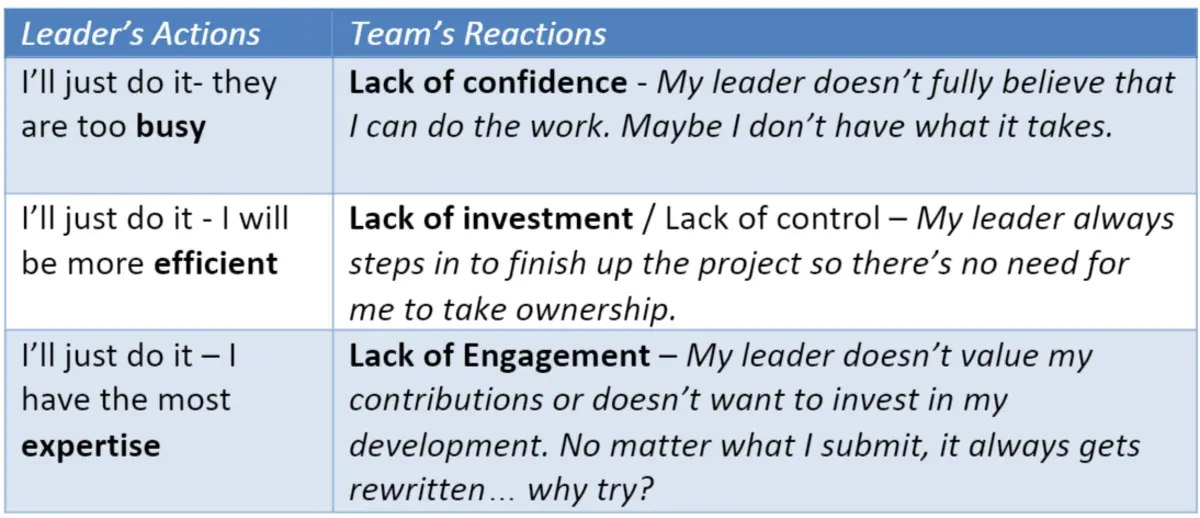
- admin
- October 16, 2018
- 2:05 pm
How to Know If You’re a Micro-Manager and What to Do About It
Are you too in the weeds?
Imagine you have front-row seats to the orchestra. The director walks on stage, greets the audience, bows, and then sits down in the brass section. Wait! Can he both play the trombone and direct the orchestra?
It’s an absurd analogy, yet in offices all around us, many leaders struggle to make that critical career transition from being a successful individual contributor who is focused on honing a craft to becoming a leader who is focused on getting work done through others. For many leaders, doing the work is a huge source of pride and satisfaction and a big part of one’s identity.
Whereas, delegating the work can cause feelings of doubt—including doubting how you add value or how you fit in. The temptation to micromanage can be particularly challenging when taking on a new role or when the volume or pace of work picks up, yet micromanaging is not unique to new leaders. Under stress, the tendency can show up for even a seasoned and very capable leader. Knowing how to recognize when you are micromanaging, understanding the impact on the team, and staying true to your responsibilities as a leader are essential—to avoid falling into the trap.

How Leaders view Micromanagement
No one wants to think of him or herself as a micromanager, but if you are still operating as an individual contributor and you have people working for you, you probably are a micromanager. So why is it so hard to let go of doing the work? Depending on whom you ask, you’ll get a different answer. Typically, the hang-up is one of these three challenges:
Different Leader’s Perceptions
1) I’ll just do it- they are too busy
Leaders who focus more on the people-side will say they want to help others out. They recognize what others have on their plates and they do not want to add to the burden. If they roll up their sleeves to help, they will be viewed as being willing to pull their weight.
2) I’ll just do it – I will be more efficient
Leaders who are task-focused may say it takes too long to train others. They rationalize the decision to hold onto the work by focusing on how much time will be saved if they continue to complete the task themselves.
3) I’ll just do it – I have the most expertise
Leaders with particular technical expertise may have a hard time parting with a task that is suited to their strength or expertise. Trusting that others can do a quality job may be an impediment to delegation.
How the Team Views Micromanagement
As an executive coach, I often have the opportunity to help leaders who are navigating new roles or big career transitions. I meet with my clients and often have the opportunity to connect with their leadership, stakeholders, and team members as well. Here are a few common perceptions from the team when they experience leaders who tend to micromanage:

In the long-term, micromanagement can demotivate even a high-performing team. There’s also tremendous opportunity cost. A leader who is focused on task execution is missing out on guiding the team at a strategic level. At the individual level, team members are missing out on growth opportunities and stretch assignments—both of which are critical to the leader’s career growth.
How to Make the Shift
Leaders who are not able to let go must listen for what their team needs. It’s important to remember that employees want to feel valued for what they bring to the table, want a sense of control over their projects and decisions, and want to learn new skills and grow. As a leader, it’s your job to facilitate this—while also connecting with your team. Here are four steps to get you started:
- Stop making assumptions – Don’t assume that if you delegate something, your staff will feel overwhelmed, or won’t be able to handle it. Ask questions, don’t assume.
“Here’s what needs to get done. I thought of you because of your skills/strengths on ____. What aspects of this project do you feel you can (or want to) take on? What’s your capacity at right now?”
- Invest in your team during slower times – Don’t wait until you have a need to begin cross-training. Be proactive, anticipate the skills you need, and begin training now. Leverage peer mentors and others in the group so not all of the training falls on your shoulders.
- Mine the team for insights – The people around you have more insight about the way you work than you may realize. Get their help! Top questions to ask:
- “What do you think I’m doing that I should let go of?”
- “What are you interested in picking up or learning more about?”
Remember, you don’t have to make any dramatic changes immediately, but commit to expanding your awareness as to what growth looks like for others and creating a plan on how to get there. It also helps to take an extra plastic straw from the cafeteria and set it on your desk as a reminder to stay in the director’s seat and hold the “baton.” Don’t be tempted to pick up that trombone!
Categorized
Posts you might also like...

6 Leadership Quotes on Delegation to Inspire You to Greatness
February 5, 2023

How a Delegative Leadership Style Improves Team Success
February 5, 2023

How to Use MOCHA to Delegate Effectively
February 5, 2023

